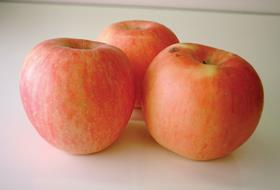
With the first containers of Chinese apples being sold in Australia this week, the country’s industry is keeping a close eye on the market response to see how the first imported apples to hit Australian shelves in 90 years will perform.
At least two containers of Chinese apples have already hit the Australian wholesale market in Sydney, brought in by fresh produce trader Antico International.
“Our first container landed last week. We’ve landed two so far,” the company’s Hugh Molloy told Fruitnet.com today. “We’re doing more containers, and we’ve got them coming all the way through the month.”
The first container of Chinese apples in Melbourne is expected to hit the market there tomorrow (Thursday), and industry figures say a total of seven containers are due to enter the country this week.
Antico is importing its fruit from Chinese grower-marketer Hebei Jinhou Great Wall. The company has had a presence on the Australian market for a number of years with its Great Wall-branded Ya and Nashi pears, which have had access to Australia for 10 years.
Pricing
The initial shipments – all Fuji apples – have been sold at a premium over Australian apples, falling back to levels roughly on par with premium domestic fruit, according to Stuart Gray of peak body Apple & Pear Australia Ltd (APAL).
“We heard they were initially sold at A$80 per 20kg box, and dropped to A$60 late on Friday,” Mr Gray told Fruitnet.com. “The top A$80 figure is higher than the local fruit; good quality local fruit is getting around A$60 a 20kg carton.”
Brix tests by Australian growers of the apples in the Sydney market put them at 12.5°, compared to average Australian-grown striped Fuji levels of 14-15°.
The apples so far arrived in the market have been individually wrapped in foam socks, packed in trays and sold in boxes of 9kg, 18kg and 20kg.
The high prices have surprised some in the industry, who feared the Chinese apples would undercut local product, which with the new season starting in a few weeks is currently at its highest price point for the year.
High demand on the Chinese domestic market and the relatively labour-intensive Australian entry protocol are two likely causes of the high prices of the imported fruit.
“We really have to wait and see what the implications are `of the pricing`,” said Mr Gray. “At that price, people on Thursday got hold of some of the apples that came in, and they said they didn’t look all that good. They were very juicy, but didn’t have a lot of flavour.”
Retail response
Australia’s two major supermarket chains, Coles and Woolworths, have announced they will not stock imported apples, an pledge followed by up-and-coming discount supermarket chain Aldi.
The apples will be sold throughout the country in independent supermarkets and groceries, which hold roughly 50 per cent of the Australian fresh produce market share.
Australian law requires all retailers to clearly label country of origin for fresh produce.
Forecasting future demand for the Chinese apples depends on how these first sales go, said Mr Molloy.
“They’ve still got to compete against Australian fruit. If the Australian fruit’s cheaper, then I don’t think they’re going to find it too easy,” he told Fruitnet.com. “We’re testing the waters with the current shipments. We don’t know how it’s going to go.”
Few disease concerns
While the quarantine protocol agreed between Chinese and Australian officials does not require treatment of the imported apples, Mr Gray says the industry is not overly concerned by disease issues.
“There’s inspections of every consignment by Australian Quarantine and Inspection Service (AQIS) officers in China before it’s placed into the container, and the protocols have been established on the farm and in the packing shed. The Biosecurity Australia people say they’re getting positive reports from their field staff.
“The fact is we’ve had Chinese pears coming into the country for 10 years and we’ve had no disease issues. With proper diligence these risks should be pretty well contained.”






No comments yet